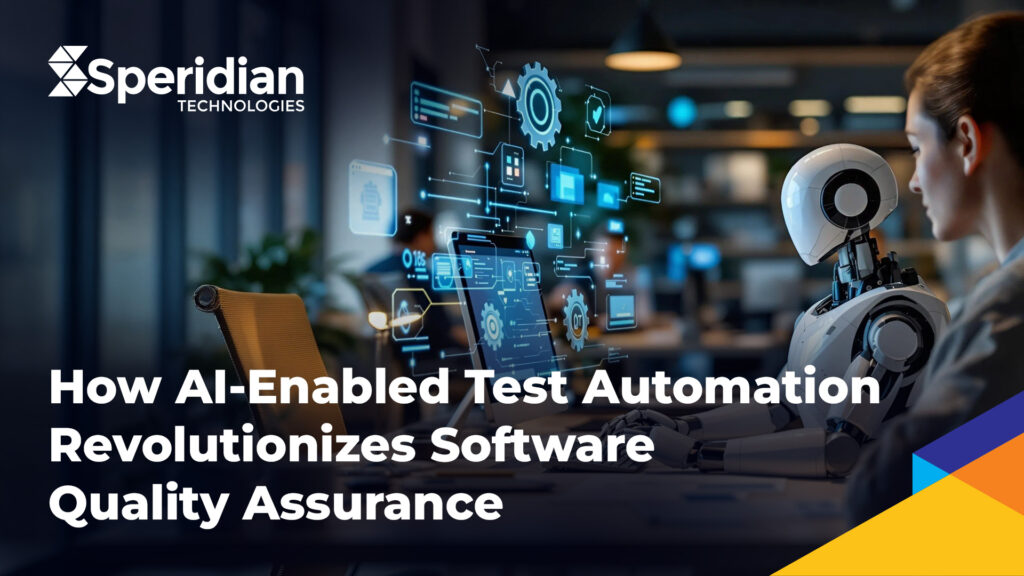In the rapidly evolving technology industry, software failures can occur when testing is not able to keep up with the rate of change. Whether it is a trading platform executing real-time transactions or a compliance-driven regulatory application, a single defect can disrupt critical operations. Traditional QA methodologies, such as manual scripts, fragmented test data, and brittle automation, are insufficient to meet the scale and speed demands of contemporary digital environments.
To stay competitive, organizations are embedding intelligence into the heart of quality assurance. At Speridian Technologies, we’ve implemented AI-enabled test automation, modernizing QA to meet the needs of today’s rapid software development and high quality standards.
This article elucidates the transformative role of artificial intelligence in software testing, demonstrating how it enhances precision, agility, and efficiency throughout the quality assurance lifecycle. Furthermore, it provides guidance on how your organization can harness this technology to lead the way in this transformative era.
Table of Contents
Software Quality with AI at the Core
At the core of this transformation lies the capability of AI-driven QA platforms to automate not only execution but also reasoning. This entails learning from patterns, predicting risks, and generating assets with remarkable speed and clarity. Here’s how intelligent automation is revolutionizing every phase of the QA lifecycle:
- Requirement Analysis & Coverage: AI can analyze requirements – whether structured user stories or narrative specs, and identify gaps, inconsistencies, and ambiguities within minutes.
- Automated Test Case Generation: From these refined requirements, AI generates comprehensive test cases, complete with step-by-step actions, validations, and conditions. This significantly reduces the dependency on manual input. Leveraging AI, the manual test cases can be automated providing a comprehensive regression test suite.
- Test Data Management: Utilizing advanced pattern recognition capabilities, AI generates realistic and compliant test data sets, ensuring readiness for deployment even in environments with frequent data refreshes.
- Self-Healing Automation: As applications undergo evolution, user interface (UI) changes frequently disrupt conventional scripts. Artificial intelligence (AI) addresses this issue through adaptive object recognition and dynamic locator strategies, thereby minimizing test maintenance requirements.
- Defect Prediction: Historical data analysis empowers AI to identify hotspots and modules with a heightened probability of failure, enabling teams to conduct more efficient testing rather than exhaustive testing.
Significant Outcomes of AI driven QA
In several recent enterprise level implementations, these capabilities have led to measurable improvements – though not always visible at first glance.
- In one instance, what previously required weeks of test data preparation for CRM validations was condensed into a matter of hours, thanks to automated profile and filing generation aligned with business logic and validation rules.
- In another engagement involving complex web dashboards, teams integrated AI into their regression suites. This allowed for anomaly detection and test execution across over 20 modules simultaneously, dramatically cutting down execution time and enhancing coverage.
- In environments where large-scale data reconciliation was critical – particularly during architectural migrations – AI was used to replicate business logic from legacy systems, compare results across platforms, and highlight discrepancies. The automation not only reduced human error but also accelerated the go-live timeline significantly.
What these examples show is that AI doesn’t just speed things up. It elevates confidence, eliminates risk at scale, and enables resource reallocation toward innovation rather than repetition.
Making QA Smarter, Not Just Faster
While speed is often the headline benefit, the real impact of AI in software testing lies in intelligence. Here’s what advanced QA teams are unlocking:
- Continuous integration of automated tests into CI/CD pipelines for early and frequent feedback.
- AI-generated test analytics dashboards showing real-time execution trends, coverage gaps, and defect severity breakdowns.
- Proactive quality engineering – where risk is mitigated upstream, and post-release fixes are the exception, not the norm.
At Speridian, we emphasize that while AI is powerful, it’s not all-encompassing. Strategic decision-making – such as defining testing scope, aligning with business risk, or designing performance tests – remains human-led. The synergy lies in combining machine precision with human judgment, and that is where our experience and expertise of over two decades comes in.
Unlocking Strategic Value from AI-Driven QA
The value proposition is clear:
- Reduced QA effort through intelligent automation.
- Improved test coverage and accuracy due to data-driven generation.
- Lower defect leakage, with earlier detection and resolution.
- Faster release cycles, enabling business agility.
- Enhanced resource utilization, as repetitive tasks are offloaded to automation tools.
Organizations embracing next-generation QA are no longer testing software reactively – they are engineering quality proactively into the software development lifecycle.
Final Thoughts
As software continues to evolve, so must the methods we use to ensure its quality. At Speridian Technologies, we are committed to helping organizations enhance their quality assurance lifecycle by embedding intelligence, improving efficiency, and applying forward-thinking strategies at every stage.
AI-enabled test automation is not a future trend. It’s a present imperative. And it’s changing not just how we test – but how we think about quality itself.
Read More About Speridian’s Software Testing Services
